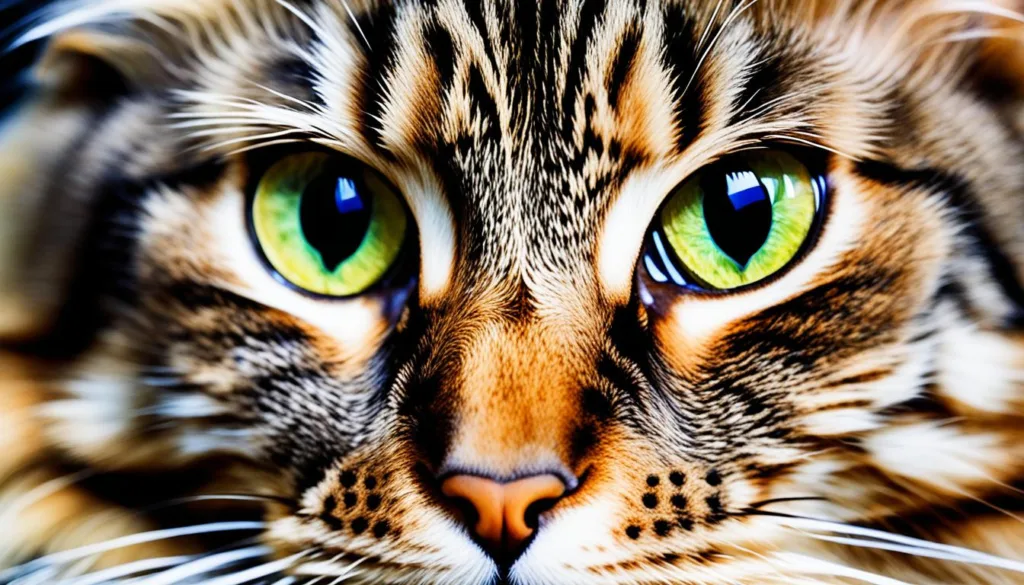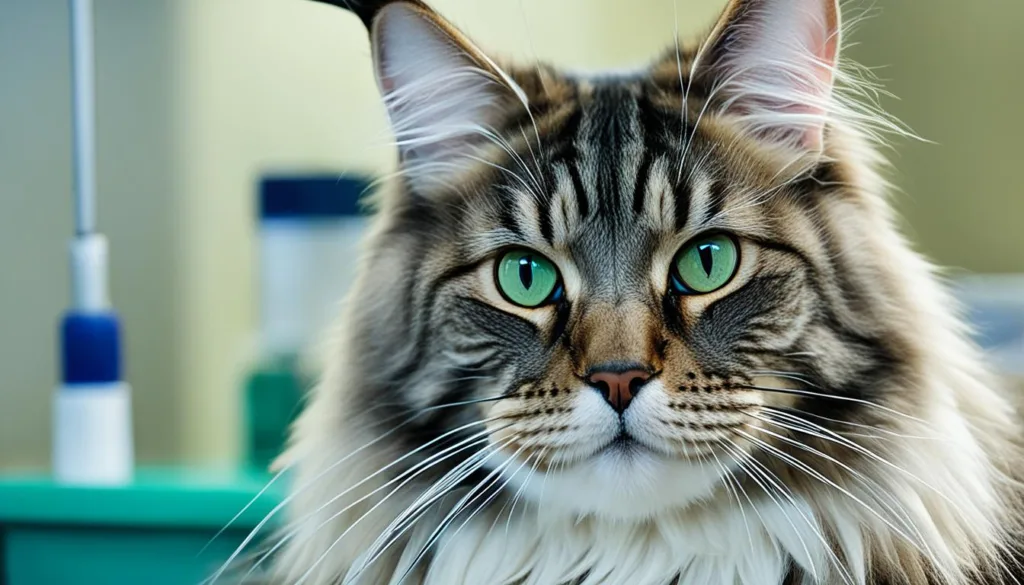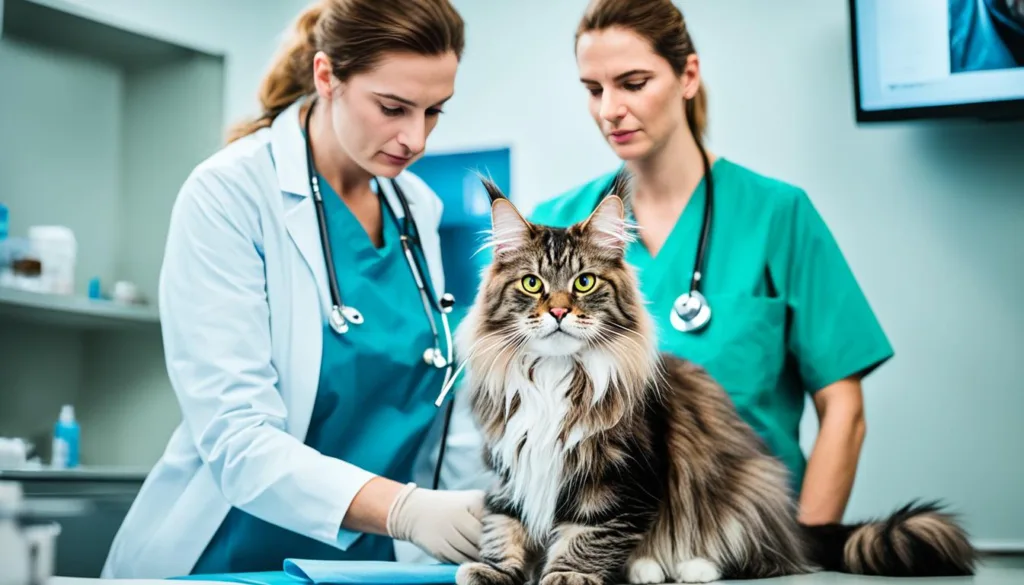Keeping our pets happy and healthy is a big responsibility. Our dogs and cats can’t tell us when they’re not feeling well. But, we can notice changes in their behavior that might mean they’re in pain or not okay. It’s important to know when to take your Maine Coon cat to the vet. This article will talk about why regular vet visits are important, what signs to look for, and when to get immediate help for your pet.
Key Takeaways
- Regular vet checkups are essential for maintaining your Maine Coon’s health and catching any potential issues early.
- Be alert to changes in your cat’s eating and drinking habits, as well as any abnormalities in their stool or digestive system.
- Keep an eye out for signs of eye infections or injuries, and don’t hesitate to seek veterinary care if you notice any unusual eye discharge or irritation.
- Vomiting, nausea, and lethargy may be indicators of an underlying health problem and should be addressed promptly.
- Seek emergency veterinary attention if your Maine Coon exhibits difficulty breathing, persistent diarrhea or vomiting, or any other signs of distress.
Importance of Regular Vet Visits
Keeping your Maine Coon healthy is key, and regular vet visits are crucial. Preventative pet care and early illness detection through pet wellness exams are vital. Even if your cat looks healthy, yearly check-ups help monitor their health and spot any issues early.
Preventative Care and Early Detection
Routine vet visits let your Maine Coon’s doctor spot problems early, when they’re easier to treat. Preventative pet care keeps your vet informed about your cat’s health. This way, they can catch issues before they get worse. This proactive care can make your Maine Coon live longer and happier.
Maintaining Your Pet’s Health
Keeping up with your Maine Coon’s pet wellness exams is key for their health. These check-ups give your vet a chance to see how your cat is doing. By fixing problems early and taking steps to prevent them, you can help your Maine Coon live a long, healthy life.
| Statistic | Value |
|---|---|
| Average Maine Coon height | 8 to 16 inches |
| Average Maine Coon weight | 4 to 8 kilograms |
| Maine Coon lifespan | 12 to 15 years |
“Regular pet wellness exams are the key to maintaining your Maine Coon’s health and catching any issues early on, when they are often more treatable.”
Changes in Eating and Drinking Habits
It’s important to watch your Maine Coon’s eating and drinking closely. Changes in these habits could mean a health issue is coming.
If your cat skips meals or won’t eat for over a day, see a vet. On the other hand, eating too much could mean diabetes or thyroid disease.
Watch if your cat drinks a lot of water. This could be kidney disease or diabetes. Keeping an eye on water intake helps spot health problems early.
| Sign of Illness | Potential Causes |
|---|---|
| Decreased appetite | Pain, illness, dental problems, stress |
| Increased appetite | Diabetes, thyroid disease, worms |
| Increased thirst | Kidney disease, diabetes, fever |
By watching your Maine Coon’s eating and drinking habits, you can spot health issues early. This helps your cat get the care it needs to stay healthy.
Eye Appearance and Discharge
Your Maine Coon’s eyes are key to their health. Redness, cloudiness, or odd discharge means they might have an eye infection or injury. These issues need quick vet care. If they squint or paw at their eyes, it’s also a sign to watch out.
Signs of Eye Infections or Injuries
Eye diseases can get worse fast. So, don’t ignore any eye changes or odd behavior in your Maine Coon. Here are some signs to look out for:
- Conjunctivitis, a common eye infection, can cause red, swollen eyes, lots of blinking, and discharge.
- Feline Herpesvirus, a common upper respiratory infection, can lead to sneezing, nasal discharge, and eye discharge.
- Allergies can make eyes irritated, causing itching, sneezing, and watery discharge.
- Cloudy or yellowish discharge means an infection like conjunctivitis, which might make the cat keep the eye closed.
- Green or bloody discharge needs vet care right away. It could be a serious infection, injury, or eye ulcer.
If eye discharge lasts over 24 hours, see a vet, even if it looks okay. Eye pain signs like squinting, lots of blinking, or looking stressed also mean you should get vet help fast.
Regular gentle eye cleaning with a soft, damp cloth can help keep eyes healthy. But, always talk to a vet before using any home remedies or meds on your Maine Coon’s eyes. This ensures you get the right diagnosis and treatment.

Abnormal Stool and Digestive Issues
Maine Coon owners should watch their cat’s bowel movements closely. Changes in stool can show how well their digestive system is working. Firm, moist stools mean everything is okay, but dry, hard stools or trouble passing them might mean dehydration or other problems.
Seeing blood, mucus, or worms in the stool is a big red flag. It could mean serious health issues that need a vet. Diarrhea that lasts over 24 hours also needs a vet check, as it might be an infection or another gut problem.
Adult cats should poop once or twice a day, while kittens may go more often. As cats get older, they might have trouble with bowel movements due to conditions like megacolon.
Sudden diarrhea in cats often comes from eating something bad. Young cats are more likely to get sick from parasites. Sometimes, cats eat something that gets stuck in their intestines, which can cause a blockage.
Strange colors in cat poop, like black, red, or dark brown, could mean there’s blood in their system. This could be from wounds, bleeding in the intestines, or other issues. Gallbladder and bile duct problems are common in cats, and gallstones can block the bile duct.
Chronic cholangiohepatitis usually hits middle-aged and older cats, while acute cholangiohepatitis shows up suddenly and severely. Cats with this condition are more likely to get infections in their gut. If caught early, treating the cause can help cats with cholestasis recover well.
If your Maine Coon shows weird changes in stool or digestive trouble, see a vet right away. Keeping an eye on your cat’s bowel movements can help keep them healthy and happy.
Vomiting and Nausea
Occasional vomiting in Maine Coon cats is usually not a big deal. But, if your cat is vomiting a lot or it keeps happening, it could be serious. If your cat throws up more than a few times in a short time, or if it keeps happening, call your vet right away.
Symptoms of nausea in cats include being very tired, hiding, feeling anxious, eating less, drooling a lot, licking lips, and swallowing a lot. These signs mean your Maine Coon might be sick and needs help.
Vomiting can be caused by many things in cats, like new food, not being able to digest food, worms, hairballs, or stomach problems. It can also be from infections, constipation, stomach or intestine ulcers, eating something bad, or some medicines.
The color and what comes up when your cat vomits can tell you a lot. Seeing bile, blood, food that wasn’t digested, or plants in the vomit means there’s a health issue. Paying attention to these things and telling your vet about them can help figure out what’s wrong.
If your Maine Coon is throwing up a lot, throwing up worms, not eating or drinking for 12 hours, has blood in its vomit, or has diarrhea, get vet help fast. Your vet can find out why and help your cat feel better.
Spotting Early Signs of Illness in Maine Coons
Maine Coons need special care because they are a unique breed. They can get certain health issues like hip dysplasia, polycystic kidney disease, and hypertrophic cardiomyopathy. Watching your Maine Coon for changes in behavior, appetite, and energy can help spot problems early.
It’s important to take your Maine Coon for regular vet check-ups. The American Veterinary Medical Association suggests check-ups every six months for adult cats. This is crucial for Maine Coons because they have specific health issues.
Look out for these signs in your Maine Coon:
- Changes in eating and drinking habits – If your cat eats more or less, drinks a lot, or changes weight, it could mean they have diabetes or kidney disease.
- Eye discharge or changes in appearance – Eye problems, injuries, or polycystic kidney disease can show up in the eyes.
- Abnormal stool and digestive issues – Diarrhea, constipation, or changes in stool could mean your cat has a gut issue.
- Vomiting and nausea – Vomiting often can mean a serious problem with an organ, blockage, or other issues.
- Lethargy and behavioral changes – If your cat is very tired, less active, or changes how they sleep or act, they might be sick.
By watching your Maine Coon closely and working with your vet, you can keep them healthy for a long time. Catching health problems early and taking care of them is important for your Maine Coon’s health.

Lethargy and Behavioral Changes
If your usually lively Maine Coon seems less interested in playing or interacting, it might be a sign of a problem. Maine Coon lethargy could mean pain, injury, or illness. Watch for unusual behaviors like sleeping more, hiding, or being aggressive. These signs can mean your cat is not feeling well.
Recognizing Unusual Behaviors
Changes in your Maine Coon’s behavior can be subtle but are often early warnings of signs of illness in cats. Look for any changes in their routine, such as:
- Increased or decreased sleeping patterns
- Reluctance to engage in play or exercise
- Changes in grooming habits, such as excessive or lack of grooming
- Aggression or avoidance of interactions with family members
- Hiding or seeking out secluded spaces more frequently
If you see any ongoing Maine Coon behavior changes, talk to your vet. They can figure out the cause and help your cat feel better.
| Behavioral Change | Possible Causes |
|---|---|
| Lethargy | Pain, illness, injury |
| Increased Sleeping | Illness, depression, aging |
| Hiding/Avoidance | Stress, pain, illness |
| Aggression | Pain, fear, stress |
Early detection and action are crucial for your Maine Coon’s health. Don’t wait to get vet advice if you see any worrying changes in your cat’s behavior or activity.
Emergency Situations
As Maine Coon pet owners, knowing when to take your cat to the vet is key. Cats often hide when they’re sick, making it hard for us to notice. Waiting too long can lead to serious health issues or even be life-threatening.
If your Maine Coon shows any of these signs, call your vet or an emergency animal hospital right away:
- Open wounds
- Broken bones
- Trouble breathing
- Seizures
- Sudden collapse
- Bleeding
- Possible poisoning
- Extreme pain
- Incessant vomiting
- Inability to pass urine
Cats can get many serious illnesses, like diabetes, upper respiratory infections, or cancer. Trust your instincts. If you think your Maine Coon might be in danger, get them to a vet fast.
| Condition | Symptoms | Urgency |
|---|---|---|
| Diabetes | Increased thirst, urination, appetite changes, vomiting, dehydration, motor function problems, coma | Immediate |
| Cancer | Varied depending on type and location, may include weight loss, appetite changes, lethargy | Immediate |
| Upper Respiratory Infection | Fever, sneezing, coughing, congestion, runny nose, decreased appetite, drooling | Prompt |
Being alert and acting fast can help your Maine Coon get the care they need in emergencies. Don’t wait to get your cat to the vet if you’re worried about their health.
Conclusion
Keeping your Maine Coon healthy means watching them closely and taking them to the vet regularly. It’s important to know how to spot changes in their behavior and health. This way, you can help your Maine Coon live a long, healthy life.
Seeing the vet often is key to catching problems early. These visits help spot issues like hypertrophic cardiomyopathy, which affects up to 34% of Maine Coons. Watch for signs of illness, like changes in eating, drinking, or acting differently. This helps you get them the care they need fast.
By focusing on prevention, you can give your Maine Coon the best care. Work with your vet and watch your cat closely. This way, your Maine Coon can live a long, happy life with you.
FAQ
Why are regular vet visits important for my Maine Coon cat?
What changes in my Maine Coon’s eating or drinking habits should I watch for?
What eye-related symptoms should I be concerned about in my Maine Coon?
When should I be concerned about my Maine Coon’s bowel movements?
How much vomiting is too much for my Maine Coon?
What are some breed-specific health considerations for Maine Coons?
When should I be concerned about changes in my Maine Coon’s activity level or behavior?
What are some symptoms that require immediate veterinary attention for my Maine Coon?
Source Links
- Maine Coon health problems—all you need to know
- When to Take Your Cat to an Emergency Vet: 6 Signs It’s Urgent (Vet Answer) – Catster

